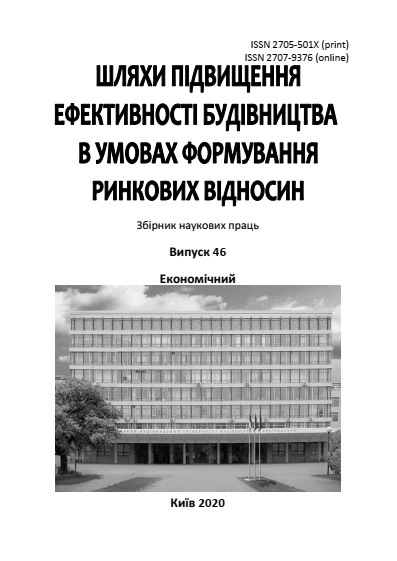Strategic and leading dominants of overcoming economic and managerial deviations of construction projects using the cost engineering method
DOI:
https://doi.org/10.32347/2707-501x.2020.46.217-229Keywords:
construction company, investment construction project, cost engineering, managementAbstract
This article is devoted to the development of a conceptual, theoretical-methodological and methodological-applied base for the application of value engineering in construction projects, the use and development of polycriteria systems of value engineering in the activities of construction enterprises. The proposed multi-vector assessment approach will modernize the concept of the content and essence of the operating system of an investment and construction project as a mobile enterprise, proposing new business display subsystems: construction and technological; a subsystem for initiating an investment and construction project, planning and diagnostics; a subsystem of administration, coordination and support. Identification of the state and prospects for the activities of construction enterprises on the basis of value engineering serves as the basis for the development of further measures to improve the efficiency of their functioning, increase the level of competitiveness, investment attractiveness, and create prerequisites for ensuring development. The results of the work will help the top management of contracting enterprises to carry out effective monitoring, structuring and maneuvering the assets of contracting construction enterprises in the process of their operating activities, will give a reasonable opportunity to adjust the economic strategy and parameters of the production and economic portfolio of construction enterprises.
Cost engineering in the article means methods of product improvement, organizational services and production technologies, the essence of which is the organizational procedure of finding the optimal ratio between the usefulness of the product and the cost of its creation, improvement and use. The main advantages of the cost engineering system are: reduction of risks for the organization; growth of advantages in domestic and foreign markets; reduction of terms of performance of works and the incurred expenses; increase in return on investment, due to the emergence of levers of influence on the project budget.
References
DOD value engineeringprogram, rtoc.ida.org/ve/ve.html (accessed Mar. 14, 2020).
Value Standard and Body of Knowledge SAVE International, The Value Society, Northbrook, IL, USA, June 2007, p. 12.
Kemmochi S., Koizumi A.,A study on the application of value engineering to the construction industry, Journal of Japan Society of Civil Engineers, Ser. F4 (Construction and Management), 2012, 68 (1), рр. 28-39.
Naderpajouh N., Afshar A. A case based reasoning approach to application of value engineering methodology in the construction industry, Construction Management and Economics, 2008, 26 (4), рр. 363-372.
Austin S., Thomson D.S. Integral value engineering in design, in: Proceedings of Cobra 1999, RICS Construction and Building Research Conference, School of Construction and Property Management, University of Salford, UK, Sep. 1-2,1999.
Palmer А., Kelly J., Male S. Holistic appraisal of value engineering in construction in United States, Journal of Construction Engineering and Management, 1996, 122 (4), рр.32 4-328.
Omigbodun, Value engineering and optimal building projects, Journal of Architectural Engineering, 2001, 7 (2), рр. 40-43.
Dell’Isola, Value Engineering: Practical Applications for Design Construction, Maintenance & Operations, John Wiley & Sons Inc., New Jersey, USA, 1997, p. xxii.
Value Engineering Handbook, Bechtel Corporation, London Execution Units, London, England, 2000, p.10.
Kazanc D. Application of value engineering in construction, Master’s Thesis, Istanbul Technical University, Graduate School of Science Engineering and Technology, Istanbul, Turkey, 2000.
Galipogullari N. Applied total construction management, Birsen Publishers, Istanbul, Turkey, 2007, p.312.
Шевчук К.І. Розвиток інжинірингу як основа ефективності будівництва в україні // К.І. Шевчук, П.П. Закорко, О.К. Шевчук/ Будівельне виробництво. 2016, Вип. 61/2. С.39-45.
Стеценко С.П. Вплив сезонних коливань на вартісні параметри будівельного виробництва /// Управління розвитком складних систем. 2017. Вип. 32. С.179 -185
Шапошнікова І.О. Вдосконалення системи державного регулювання ринку житла на засадах вартісного інжинірингу. Шляхи підвищення ефективності будівництва в умовах формування ринкових відносин. 2018. №38. С.205-214.
Вахович, І.В., Дем’яненко О.О. Фактори, що впливають на вартість інжинірингових послуг в будівництві. Вісник Харківського національного університету імені В. Н. Каразіна Серія «Економічна». 2020. Випуск 98. С. 97-108.
Сорокіна Л.В., Гойко А.Ф. Методичний підхід до оптимізації витрат будівельних підприємств в умовах невизначеності. Шляхи підвищення ефективності будівництва в умовах формування ринкових відносин. 2014. №31. С.76-84.
Сорокіна Л.В., Гойко А.Ф., Скакун В.А. До проблеми вдосконалення методів прогнозування вартісних показників житлового будівництва. Будівельне виробництво, 2015, №59, с. 7-17.
Малихіна О.М. Модернізація економічного розвитку будівельних організацій: детермінанти моделі та пріоритети стратегії [Текст] / О.М. Малихіна, Д.А. Рижаков, Я.Ф. Локтіонова, Т.С. Коваль // Управління розвитком складних систем, 2018. Вип. 34. С. 152-160.
Downloads
Published
How to Cite
Issue
Section
License

This work is licensed under a Creative Commons Attribution 4.0 International License.
Authors who publish with this journal agree to the following terms:
- Authors retain copyright and grant the journal right of first publication with the work simultaneously licensed under a Creative Commons Attribution License that allows others to share the work with an acknowledgement of the work's authorship and initial publication in this journal.
- Authors are able to enter into separate, additional contractual arrangements for the non-exclusive distribution of the journal's published version of the work (e.g., post it to an institutional repository or publish it in a book), with an acknowledgement of its initial publication in this journal.
- Authors are permitted and encouraged to post their work online (e.g., in institutional repositories or on their website) prior to and during the submission process, as it can lead to productive exchanges, as well as earlier and greater citation of published work (See The Effect of Open Access).

